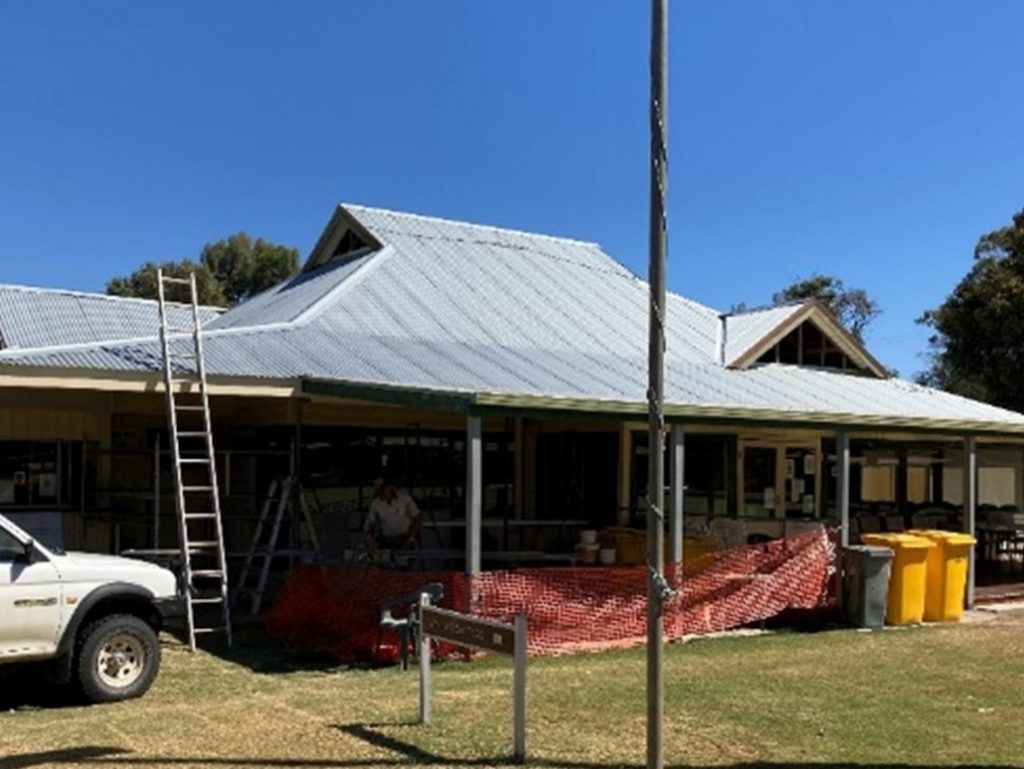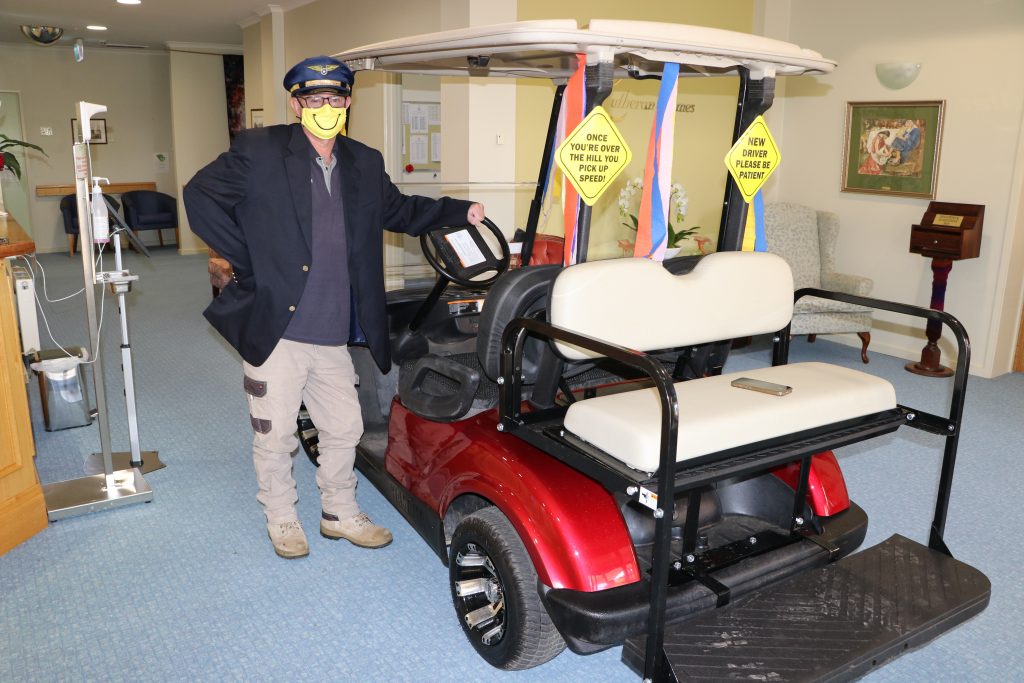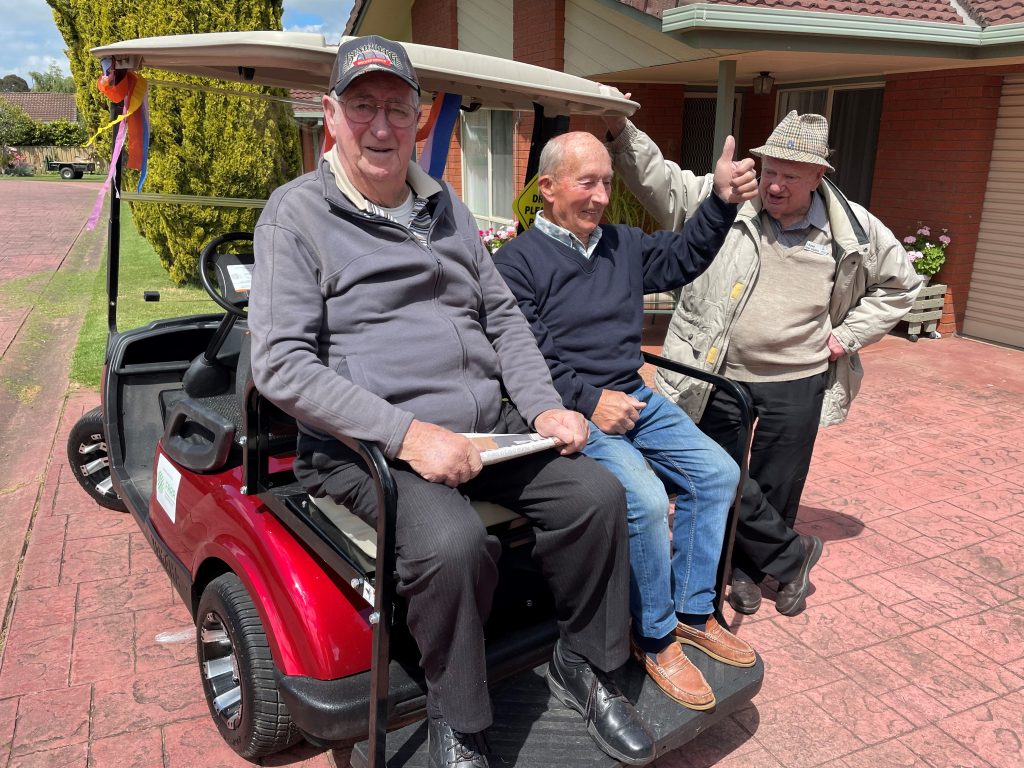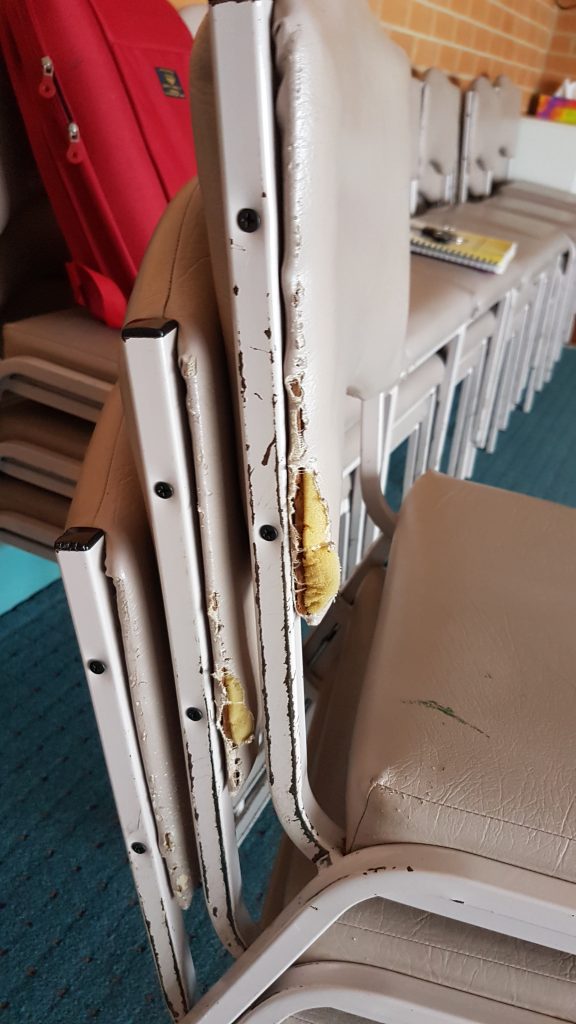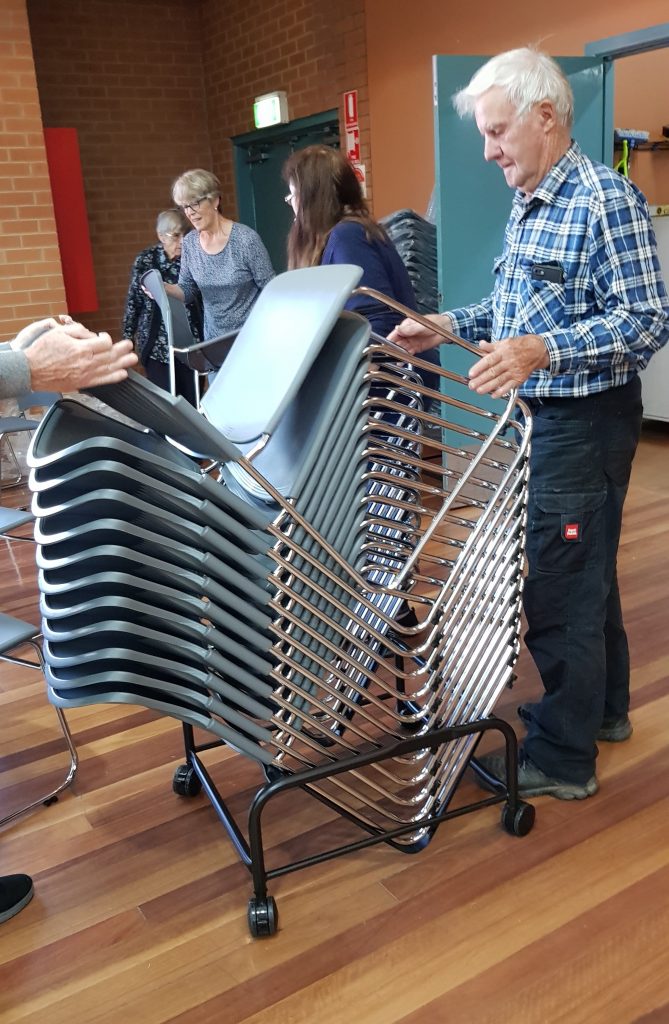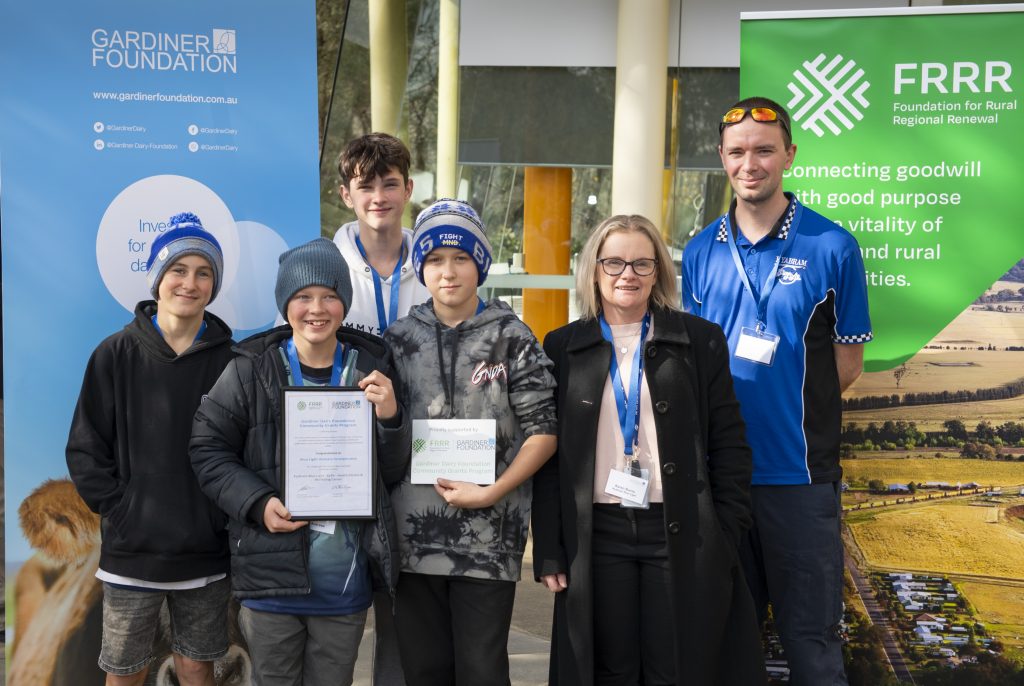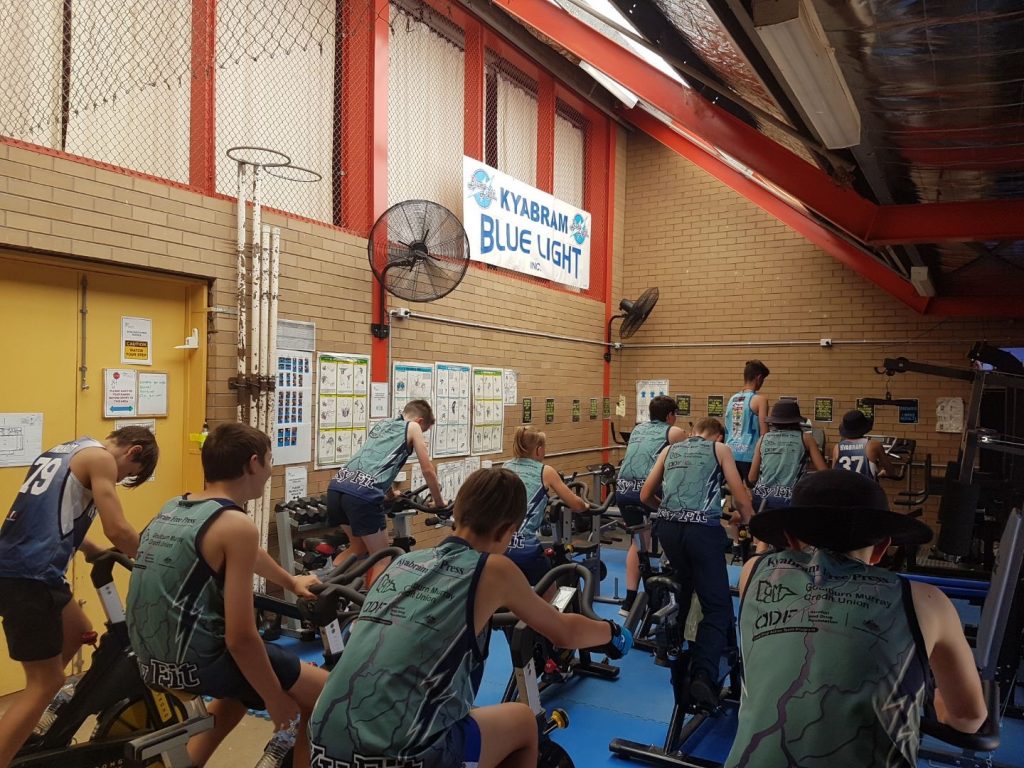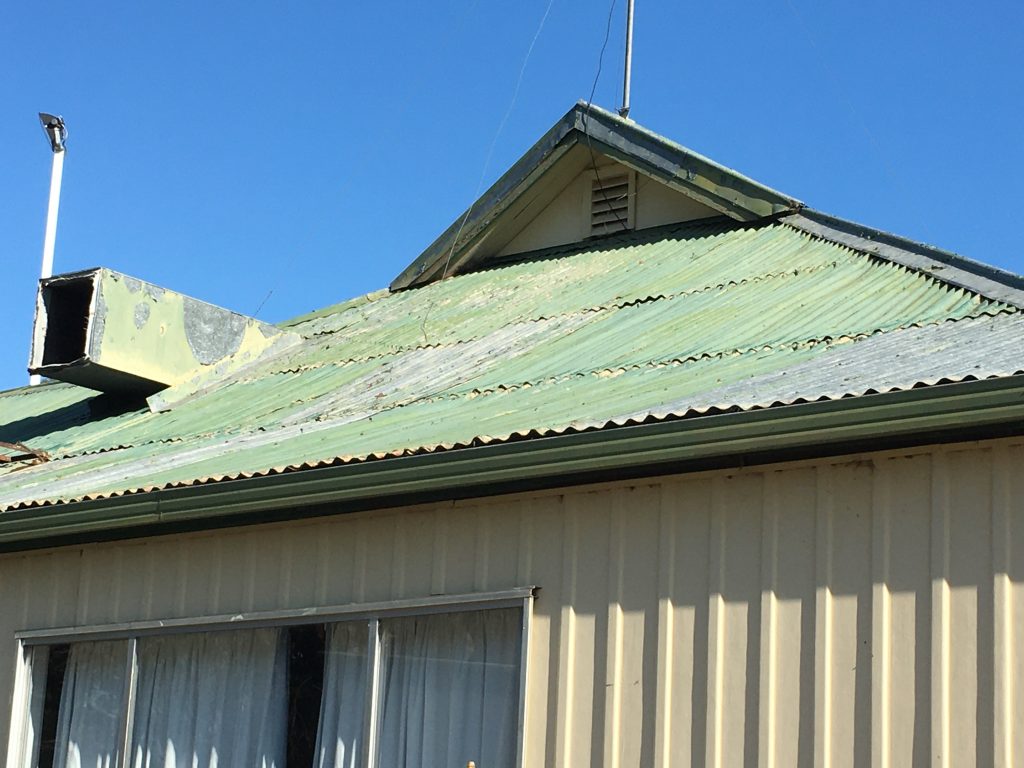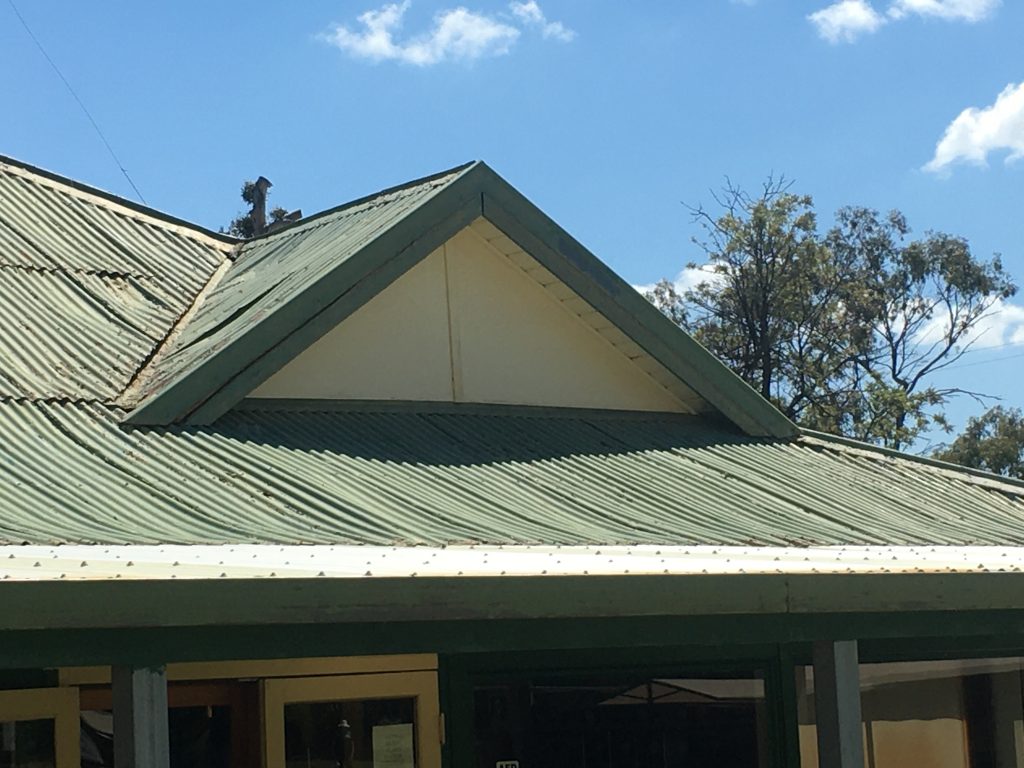Foundation for Rural & Regional Renewal (FRRR)
In many aged care facilities social isolation among elderly residents has been an ongoing battle, especially during COVID, as restrictions and lockdowns prevented family and friends visiting loved ones for almost two years. Luckily for the residents of Eventide Lutheran Homes (ELH) in Hamilton, Victoria, the future is now looking decidedly more social.
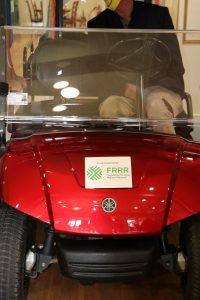
Thanks to a $10,000 Strengthening Rural Communities (SRC) grant supported by Ian Rollo Currie Foundation, ELH was able to purchase a golf buggy that has been assisting with the transport of residents with mobility and sight issues around the facility. This has been especially useful for building social connection among residents who previously may not have engaged with organised activities due to the difficulty of getting around.
The golf buggy has three seats available to move the residents around in a comfortable and protected way across the facility, including the gardens, the golf course, and any other location the residents wish to visit.
The purchase of the buggy has been an absolute success for not only the residents, but for the staff and volunteers as well. After 18 months of almost constant lockdowns, the volunteers and social activities staff have been very excited to see more activities in the facility and to see the enjoyment of the residents. Staff members have also been seen taking more ownership over projects and events within the facility.
In one instance, a resident was taken for a drive around a nearby golf course where he had previously played golf with a handicap of four for 50 years. He was visibly moved by the experience of visiting the golf course once again.
The buggy arrived at Eventide on the 8 November 2021 and was christened with a celebration morning tea and rides for residents outside. Unfortunately, the weather was not so kind, and the rides had to be cut short. But since then, the buggy has been moving people around the grounds with no issues.
“Apart from the obvious enjoyment of the residents it was exciting to see different staff members taking ownership and being part of the project. After 18 months of almost constant lockdown, none or very few volunteers and few social activities staff were very excited to have social activities in the facility and see the enjoyment of the residents. This had a positive effect on staff and they are busy planning events for the buggy.
Visitors who have been prevented from freely seeing their loved ones for almost 2 years have been excited and engaged in the project and will be able to take their loved ones for rides outside.”
The NSW / VIC border towns of Albury / Wodonga and surrounds were severely impacted by the cross-border lockdowns during COVID restrictions. THose who live in these adjacent communities consider them one town, yet community members were unable to cross the border unless there was an extenuating circumstance. That meant families were unable to support isolated elderly family members and those living in challenging conditions, and this was exacerbated by the devastating effects of the Black Saturday bushfires which also affected the community.
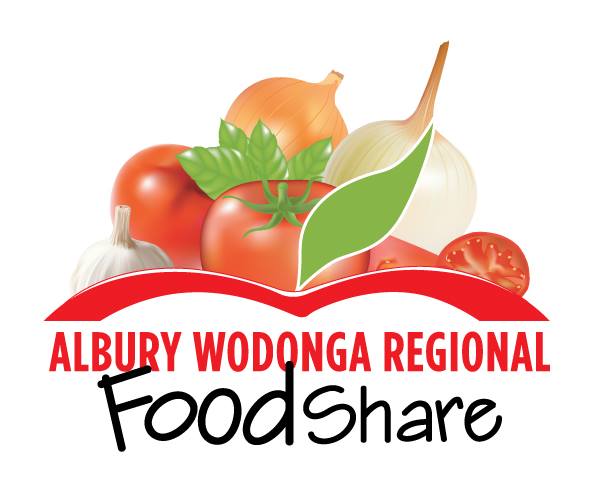
The COVID Regional Community Support program, which was funded by the New South Wales Government and delivered by FRRR, was designed to support community groups and associated volunteers that incurred expenses in delivering food and personal care items to individuals and families affected by COVID lockdowns, by contributing funds to support ongoing service provision.
One such organisation to benefit from this program with a reimbursement grant of $13,500 was Albury Wodonga Regional FoodShare, who has supported those in need in their community since 2011, and their response to the COVID-19 pandemic was remarkable.
FoodShare commenced their Community Pantry program in 2020, which enabled food hampers to be delivered directly to members of the community. To alleviate some of the hardship experienced by families in the region due to the long-term impacts of COVID and cross-border lockdowns, they also coordinated two local pop-up hamper drive-throughs in September 2021, which provided 300 families with emergency food relief.
During the peak of the COVID outbreak, 1,200 food hampers, including culturally appropriate ingredients, were distributed locally across the region. More than half of these were delivered directly to local homes as part of a coordinated COVID emergency relief effort.
To facilitate the immediate increase in demand for FoodShare’s services, operations were extended to seven days a week. This put a strain on resources, particularly on volunteers, but was necessary to keep the community safe. On average, 30 households received hampers each day, and in many instances, this doubled on occasions during the peak of the local COVID outbreak.
To provide specialised support for culturally and linguistically diverse (CALD) communities, FoodShare was supported by local organisations such as Albury-Wodonga Ethnic Communities Council (AWECC) and Murray Valley Sanctuary Refugee Group. These agencies took enquiries from CALD households who were in isolation due to the COVID outbreak. These agencies also assisted by nominating culturally specific ingredients and in some instances. their volunteers purchased additional food items and delivered these to the CALD households.
In addition to delivering hampers to local residents, FoodShare was also asked to deliver food and personal care hampers to various locations where people had been forced to isolate in accordance with Health Orders, including Rutherglen Hotels, Howlong and the Albury Caravan Park. Over 4,500 kilometres were logged from October to December last year on just one of the FoodShare vans, which was dedicated to supporting COVID operations. To support the heightened increase in demand, an additional van was also hired in November to support delivering hampers to COVID households.
This is a wonderful example of the critical role that so many local NFPs played, and the way in which they collaborated with other groups to support their community. FRRR is pleased to have been able to support this program and help the NSW Government to reimburse FoodShare for some of the costs incurred in supporting their community.
Twenty-one projects in Victoria’s main dairy regions – Gippsland, Northern Victoria, and South-West Victoria – have been awarded $91,833 in grants, which will help to build the capacity of local community organisations and improve digital connectivity.
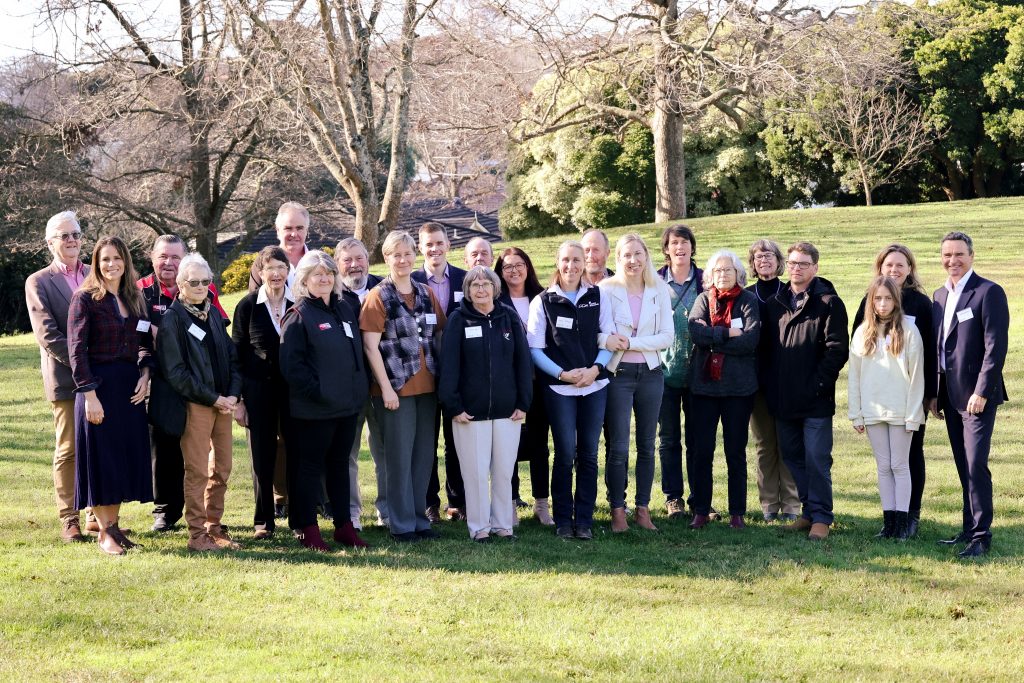
The grants are through the Gardiner Dairy Foundation Community Grants Program, which is delivered by the Foundation for Rural & Regional Renewal (FRRR). This marks the 20th year of the program, which has seen more than 500 grants awarded, valued at more than $2 million during that time.
The latest round of grants of up to $5,000 will go to grassroots organisations and not-for-profits that are critical to the sustainability of dairy farming in Victoria.
Gardiner Dairy Foundation Chief Executive, Allan Cameron, said he is delighted to continue supporting dairying communities.
“After 20 years, the Community Grants Program continues to support Victorian regions that are reliant on the dairy industry. Local groups play an important role in enhancing the vitality of these communities.
“These grants will help local organisations in many small towns to thrive with initiatives that range from COVID recovery and disaster preparedness, to improved digital capabilities and facility upgrades. The grants help to ensure the viability of these organisations,” Mr Cameron said.
Natalie Egleton, CEO of FRRR, said there was strong demand for this kind of support.
“Half of the projects receiving funding are geared towards building organisational capacity or improving access to the internet or digital technologies. This is a reflection of how the last couple of years have impacted remote, rural, and regional community groups and a great reminder of why it’s important to engage in conversations with the locals on the ground and find out how we can adapt our approach to better serve the needs of their communities.
“We are delighted to have maintained such a strong partnership with Gardiner Dairy Foundation for the last two decades,” Ms Egleton said.
Community groups were presented with their funds at a series of ceremonies held in the regions during June and July. A complete list of the projects supported is available below. They include:
- Gippsland Dairy Region – The Aboriginal Literacy Foundation Inc received $5,000 to enhance literacy outcomes for Indigenous primary school children with a dedicated tutoring program.
- Northern Dairy Region – Corryong Neighbourhood House Inc received $5,000 to grow the organisation’s capacity to support the community with the provision of computer equipment and software.
- South-Western Dairy Region – Camperdown Botanic Gardens and Arboretum Trust Inc. received $4,752 to build organisational capacity through developing digital capability that will promote and enable wide engagement with Camperdown Botanic Gardens and Arboretum.
The full list of grant recipients and their projects are below.
| Organisation | Project | Location | Grant | |||
|---|---|---|---|---|---|---|
GIPPSLAND | ||||||
| The Aboriginal Literacy Foundation Inc | Post COVID Literacy Support for Aboriginal Students in the Gippsland region | Bairnsdale | $5,000 | |||
| Camp Cooinda Incorporated | Training Safety Boat Operators for Camp Cooinda | Banksia Peninsula | $3,000 | |||
| Manna Gum Community House Incorporated | Manna Gum Gathering Place - Stage 3 | Foster | $5,000 | |||
| Neerim District Soldiers Memorial Hospital | Communication Integrity - Satellite Phone | Neerim South | $3,050 | |||
| Port Albert Maritime Museum | Letting History Speak | Port Albert | $5,000 | |||
| Toora Primary School | Netball lines in Stadium | Toora | $5,000 | |||
| Trafalgar Holden Museum Inc | Replacement of chairs | Trafalgar | $5,000 | |||
| Newry Hall Upper Maffra Mechanics Institute Incorporated | Hall Internet Connection | Newry | $3,000 | |||
| Venus Bay Tarwin Lower and District Mens Shed Incorporated | “Stop Washing Dishes by Hand and Greater Community Participation” | Venus Bay | $5,000 | |||
| Welshpool and District Primary School | IncrediGirls | Welshpool | $5,000 | |||
| NORTH EAST VICTORIA | ||||||
Corryong Neighbourhood House Inc | Digital Growth Grow the organisations capacity to support the community with the provision of computer equipment and software. | Corryong | $5,000 | |||
| Girgarre Community Centre | Building Connections with Technology Build the capacity of Girgarre Community House to increase community access to online services in collaboration with neighbouring town Stanhope. | Girgarre | $5,000 | |||
| Kyabram Development Committee Incorporated | Kyabram Tastes & Tunes Strengthen the social and economic outcomes of Kyabram through support of the Tastes and Tunes Festival. | Kyabram | $5,000 | |||
| Rochester Community House Inc | It’s Time for New Tools Improve facilities and equipment to increase participation and safety with the purchase of new tools for the Rochester Mens Shed. | Rochester | $2,900 | |||
| SOUTH WEST VICTORIA | ||||||
Anam Cara House Colac Inc | Strengthening Community Connections through Information Technology Final stage Build organisational capacity to support resident’s socialisation and staff training with Smart TV equipment. | Colac | $2,446 | |||
| Archers of Warrnambool Associated Incorporated | Combined Clubs Mower Improve equipment to support volunteer participation with a mower to maintain grounds for combined community activity and tourism. | Allansford | $5,000 | |||
| Camperdown Botanic Gardens and Arboretum Trust Inc. | Camperdown Botanic Gardens and Arboretum digital engagement project Build organisational capacity through developing digital capability that will promote and enable wide engagement with Camperdown Botanic Gardens and Arboretum. | Camperdown | $4,752 | |||
| Loved and Shared Incorporated | Loved & Shared, Establishing the Warehouse Increase organisational capacity of this start up not-for-profit group to repair and distribute nursery equipment and children’s clothing and items to the community. | Warrnambool | $5,000 | |||
| Pennyroyal Hall Committee | Pennyroyal Hall Refurbishment Improve community facilities at Pennyroyal by replastering the local hall. | Pennyroyal | $5,000 | |||
| Purnim Recreation Reserve | Upgrade Pavilion Kitchen Appliances Upgrade the kitchen facilities at the Purnim Community Recreation facility to support community events and activity. | Purnim | $3,500 | |||
| Simpson Indoor Bias Bowls Club Inc | Indoor Bowls Carpet Mat upgrade Boost volunteer vitality with the provision of replacement bowls carpet to support community activity for the Simpson community. | Simpson | $4,235 | |||
The FRRR team recently received some lovely feedback from the Management Committee of The Lakes Entrance Mechanics Community Hall. In 2021, they applied for a Strengthening Rural Communities grant to make upgrades to the community hall. Here’s what they had to say…
The Lakes Entrance Mechanics Hall Management Committee is delighted to announce that the new chairs, purchased with the support of a grant from the Foundation for Rural & Regional Renewal (FRRR), have arrived and are ready to use.
The Lakes Entrance Mechanics Institute Hall is the hub of community events. Ceremonies, celebrations, meetings, community clubs, federal and state elections, breakfasts, parties, dances, concerts and bingo all take place within its four walls.
Our old chairs were dilapidated, heavy, hard to stack, hard to move, and took up half of our storage space. Committee spokesperson Pennie Anderson is delighted. “I love these chairs’, she said.
“They are lightweight, ergonomic and stack easily on specially designed trolleys, so a whole stack of 20 can be moved by an average sized person. They take up half the space of the old ones in the storeroom”.
Purchased locally from Workplace Systems in Bairnsdale, the chairs have been met with approval from the regular hall users. Below are some of the comments from community members:
“They are awesome– very easy to move and set up for our productions” – Di Dixon, President, Lakes Entrance Amateur Dramatic Society
“We found the handling of the chairs a much easier exercise all round. Also, when chairs were moved around during the meeting there was not the annoying scraping noise on the floor” – Stan Barker, President, Lakes Entrance Garden Club
“They look very smart and are much quieter on the floor” – Bingo, Lions Club
During recent community planning led by Murrindindi Shire in the Yea region of Victoria, which is located around 100km from Melbourne, the need to increase awareness of local history and culture was highlighted. To address this need, a working group, named Honour the Taungurung Community Project Group, was formed.
The group, which are part of the Yea Community Service Group, set out to address a lack of local information and visual acknowledgement of the past and present Taungurung people. The group decided that the creation of a meaningful Taungarung designed art installation was the perfect way to begin telling the true history of their shire.
Yea Community Service Group successfully applied for a grant of $28,734 from the Victorian Bushfire Appeal Fund. The grant funded the artwork, engineers’ drawings, Council permits and the installation, as well as a welcome ceremony, research and project administration.
Now, with the project complete, the significant and celebratory artwork is located in the main street of Yea and acts not only as a centrepiece for the town but also as a meeting place and a celebration of local history.
Once the art installation was completed, an unveiling and welcoming ceremony was held and attended by many town members. As a result of this project, the town now has a meaningful site where Indigenous days of recognition can be celebrated, as well as an enduring landmark in honour of the Taungurung people. Community connectedness, sense of place and community identity have all been strengthened in the months following the installation.
This case study is courtesy of the Gardiner Dairy Foundation
A new teen fitness program in Kyabram is inspiring community spirit and building fit and healthy bodies.
A health and wellbeing centre has been established by Kyabram Blue Light at the town’s P-12 College, thanks to $5,000 from the Gardiner Dairy Foundation Community Grants Program in partnership with Foundation for Rural & Regional Renewal (FRRR).
The centre has proven to be a holiday hit with local teenagers and will be used regularly during the school year.
It is part of the KyFit police and teen gym-based mentoring program and, according to organiser Senior Constable Mitchell Bull, the benefits are wide-ranging.
Teenagers have played a central role in establishing the gym in an old storeroom at the school.
“The kids have done the majority of it,” Senior Constable Bull said. “They put together a wish list of equipment, posters and information and then volunteered on weekends to load trailers and remove rubbish and then helped in designing the layout and setting up and testing the equipment.
“It’s not just given to them on a silver platter – it’s a community effort and we all chip in. For six or seven weekends in a row we had up to 10 kids at the gym helping out. We removed six trailer loads of rubbish from the storeroom.”
The gym includes two bench presses, two rowing machines, two magnetic resistance bikes, two treadmills, two decline sit-up benches, sets of dumbbells from 3kg to 10kg and 13 spin bikes for classes.
The Gardiner Foundation grant also helped with installing fans, electrical power points and tiles for the floor.
“We made every cent count and called in favours left, right and centre and had a lot of volunteer assistance with everything,” Senior Constable Bull said. “It’s nothing fancy but it’s equipment tailored to young people.”
The gym is the latest development in the KyFit program that started in 2019 and is run by Kyabram Blue Light using police members, volunteers and community members.
“It was identified there was a need for a sporting or physical program that didn’t require the time, cost and travel commitments of the likes of football or netball,” Senior Constable Bull said.
“The gym will help those who may not have the opportunity to be involved in the local gyms or sports clubs.”
Personal trainers, defence force members, police and other community members help with the program, ensuring young people can access a variety of training programs ranging from boxing to swimming sessions and pitting their abilities against the police fitness test challenge.
A weekly in-school program attracts at least 13 participants and after-school programs are reaching about 30 teenagers. The school also uses the facilities for physical education classes.
Senior Constable Bull said the grant had helped to empower local young people. “We used the gym over the school holidays, allowing kids to drop in when there wasn’t much else to do – we can barely keep up with the demand,” he said.
“A lot of kids want to join the program now because they’ve seen the benefits the others are getting. It’s helping with their physical and mental health and the kids are seeing the benefits of physical activity and working out with other people.”
Police can also use the fitness programs to help break down barriers between officers and young people.
“The kids get the benefits of getting to know local police and other volunteers and mentors,” Senior Constable Bull said. “It’s about building a relationship between police officers and young people and showing we’re approachable if there is a problem in the community that needs to be discussed.”
It’s also beneficial for police. “It means we’re not always seeing the negative side of things in the community and we get to work towards positivity,” Senior Constable Bull said.
The program is free for local teenagers who also receive a free sports top when they get involved.
In recognition of his work with young people, Senior Constable Bull was named Citizen of the Year for Campaspe Shire at the 2022 Australia Day Awards.
Now in its 20th year, the Gardiner Dairy Foundation Community Grants Program is delivered by the Foundation for Rural & Regional Renewal (FRRR). Grants of up to $5,000 help not-for-profit organisations in small Victorian dairy communities deliver projects that will benefit local people and strengthen their ability to deal with local issues and enhance existing community infrastructure.
Applications for the 2022 program opened on 1 March and close on 13 April. More information can be found at https://frrr.org.au/funding/place/gardiner-communities-grants/
$120,000 in Gardiner Community Grants available
The annual Gardiner Dairy Foundation Community Grants Program (Gardiner Community Grants) has opened today. Delivered in partnership with the Foundation for Rural & Regional Renewal (FRRR), this round marks the 20th year of the program, which is focused on supporting communities across Victoria’s three dairying regions.
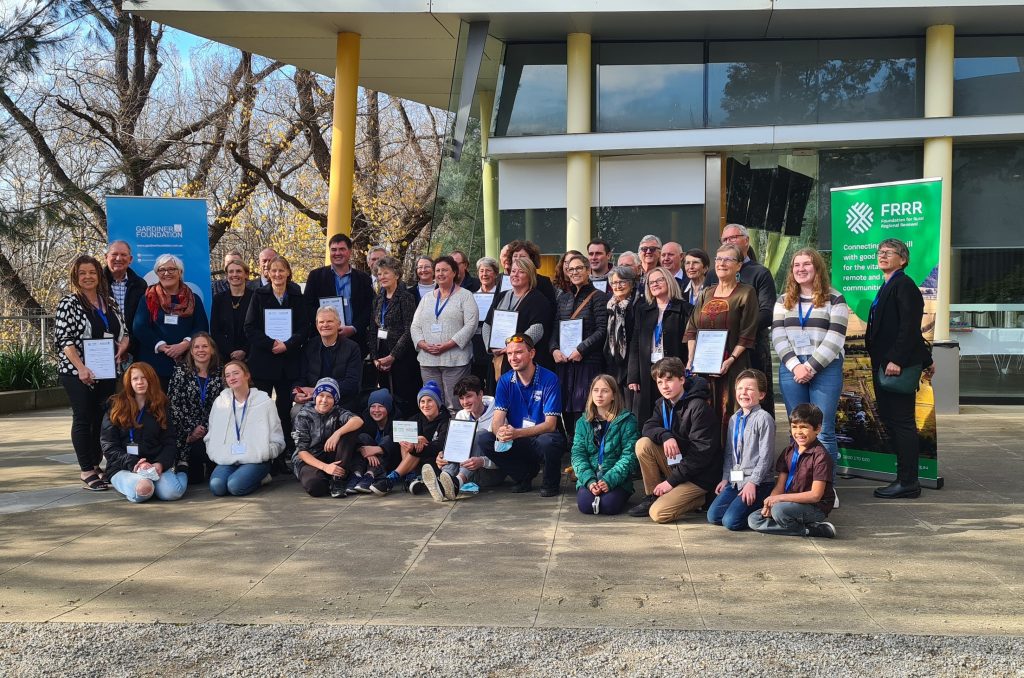
This year Gardiner Community Grants will encourage projects to focus on building the capacity of community organisations and improving digital connectivity. The new focus is in response to insights from FRRR’s Heartbeat of Rural Australia Report, which was published late last year.
The report highlighted that there was a significant digital divide in rural communities, compared to urban areas, and that local not-for-profit organisations needed capacity building support to be able to do their vital work, particularly following the impacts of back-to-back disasters, including COVID, on fundraising and volunteers.
A digital connectivity grant project might involve upgrading infrastructure and facilities, improving digital access or providing training that enables the community to benefit from digital services.
A building capacity grant aims to support organisations to sustain or grow the effectiveness of their operations. Funds may be requested for salaries to increase the organisations paid workforce, training for volunteers, upgrading office equipment or supporting strategic planning and improved governance.
The small grants program, which has $120,000 in available funds for grants up to $5,000, will continue to support a broad range of community projects that local groups identify can make their community socially, economically or environmentally stronger. Applications for events to enhance cultural vibrancy, volunteer planting projects to support environmental sustainability, extending education and training opportunities, support for infrastructure projects or programs to improve health and wellbeing are all encouraged.
Allan Cameron, Gardiner Dairy Foundation Chief Executive Officer, said Gardiner is committed to strengthening Victorian dairy communities and is pleased to be partnering with FRRR for the twentieth year to support innovative, community-driven projects.
“Investing in the communities that are at the heart of the Victorian dairy industry is critical to the sustainability of dairy farming in Victoria. Since launching the program with FRRR in 2002, Gardiner Dairy Foundation has supported over 500 local projects and distributed more than $2 million to Victorian dairy communities.
“Gardiner is committed to supporting the needs of the communities as they change and evolve, now, and in the future. That’s why, this year, we are encouraging initiatives around digital literacy and organisational capacity, to help local groups respond to the current needs of Victoria’s dairy communities,” Mr Cameron said.
Natalie Egleton, CEO of FRRR, said that the Heartbeat of Rural Australia Report called for more support to go to community groups to address critical issues, and it’s wonderful to see Gardiner Foundation respond.
“Our Heartbeat Report highlighted significant gaps and challenges for rural communities, but also highlighted the critical role that local not-for-profits play in meeting the needs and filling the gaps in rural communities. That’s why we value our longstanding relationship with Gardiner, because they, like us, are committed to working together to support these vital community groups in the long-term.
“For 20 years, Gardiner’s Community Grants have consistently boosted Victorian dairy communities with contributions towards large important community projects, and significantly enabling many smaller community organisations and projects, often for items and activities that are less accessible through government or major philanthropic funding,” Ms Egleton said.
Applications for the Gardiner Dairy Foundation Community Grants Program open Tuesday, 1 March and close Wednesday 13th April 2022 at 5 pm AEDT. More information can be found at – https://frrr.org.au/gardiner-communities-grants/.
Three regional communities to take part in multi-year initiative
FRRR’s Disaster Resilient: Future Ready (DR:FR) Victorian program continues to build steam, with three regional communities selected to partner with the Foundation to strengthen the resilience and preparedness of their regions.
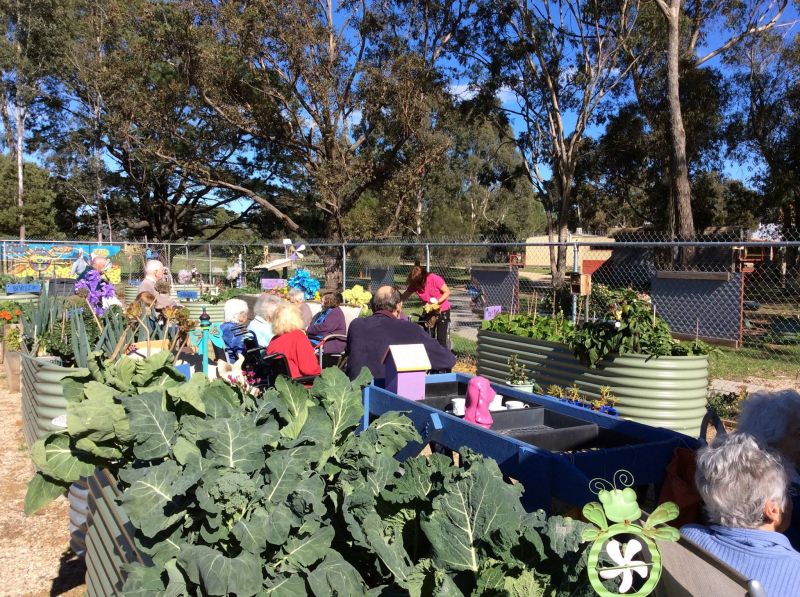
Korumburra, Myrtleford and Whittlesea township and surrounds will receive support as part of a multi-year, community-led program that is supported by a number of philanthropic organisations.
Nina O’Brien, FRRR’s Disaster Resilience and Recovery Lead, said that the DR:FR initiative works to better prepare communities to address the impacts of climate change, natural disasters and broader disruptions that affect the sustainability, vitality and resilience of remote, rural and regional communities across Australia.
“This is a place-based initiative, whereby FRRR works at a hyper-local level with grassroots organisations and community representatives who are interested in collaborating and leading initiatives to increase community preparedness and strengthen resilience capacity.
“The model is designed to help communities identify and then enact solutions that are held in local knowledge and the intersections of people and place. It creates space, facilitates processes, builds relationships and provides resources for community-generated resilience conversations and initiatives to be held at a pace and style that is appropriate for each local community,” Ms O’Brien explained.
Community driven
Late last year community representatives were invited to submit an Expression of Interest (EOI) to become partner communities. Over the past eight months, FRRR’s DR:FR Program coordinator has engaged with representatives from the shortlisted communities, listening and learning about what is unique and important to each place and exploring their readiness, willingness, and capacity to participate in this intensive process.
This process helped FRRR understand their shared aspirations, what they believe is important about their community and demonstrated the commitment and interest in participating in the program.
“The emphasis is on the communities being actively engaged and involved in the process. Our aim is to empower local people to build and adapt the strengths, tools and resources that already exist in each community to further strengthen the resilience and preparedness of each place. It will be community-led and tailored to each community, with support and resources provided to allow them to identify, create and sustain their own resilience-building approaches,” Ms O’Brien said.
The program will start in the next month, beginning with a series of activities to bring interested community members together and start engaging with the broader community around aspirations for the future. In addition to the facilitation support from FRRR, the communities will have access to funding for community activities that support community engagement activities and a seed funding pool to engage a local community connector and activate priority actions identified through the DR:FR journey.
More communities waiting in the wings
“While three communities have been selected, there is strong interest from other places to participate in this program,” Ms O’Brien said.
“We have several communities keen and ready to jump on board and we would love to work with them. Our hope is to expand this program to at least one other Victorian community, and we also have groups in other states wanting to be involved.
“But this requires further funding, so we and our partners can work alongside and support local leaders to create meaningful and lasting change that means they can endure, adapt and evolve from disruptions and disasters more quickly, positively and strongly.
“We are grateful to our current partners for making the Victorian DR:FR program possible. We’d love to hear from others with the capacity to partner with us to expand the program,” Ms O’Brien said.
The DR:FR initiative is kindly supported by the following partners: Sidney Myer Fund, Lord Mayor’s Charitable Foundation, Maple-Brown Family Foundation, Simon Kucher and Partners, Ronald Geoffrey Arnott Foundation, H & L Hecht Trust, Suncorp, Pinnacle Charitable Foundation and the Doc Ross Family Foundation.
For more information about the program, visit https://frrr.org.au/drfr-victoria/.
When COVID restrictions hit Woomelang, the tiny Victorian town with a population of 201 was already struggling after being hit by major drought.
More than half the residents live alone, with many people having chronic diseases and some having mobility and travel issues. The closure of the town’s primary school and football club has reduced the interaction and connectedness of families and left community members fragmented. People on farms affected by the drought were working hard and spending a lot of time alone. So there was a clear need to create opportunities for social interaction.
A grant from FRRR’s Tackling Tough Times Together (TTTT) program, funded by the Australian Government, allowed Woomelang & District Bush Nursing Centre to do just that.
The Centre used the $5,000 grant to create ‘Meet, Eat and Play’, in an effort to relieve the social, emotional and financial stress facing the community.
The grant enabled the group to fund venue hire, staff and catering to create several lunchtime and evening social gatherings, which included themes such as Feast and Film, Xmas in September, Biggest Morning Tea, volunteer lunches, COVID clinics, Crafty Ladies and a Women’s Health Morning Tea.
Centre Manager Carol Paech said idea behind the project was for people to ‘meet, greet, eat and have fun’. It meant single people did not need to eat alone. COVID restrictions meant they couldn’t hold all the planned monthly gatherings but over the course of 2020-21 they were able to host a variety of catchups.
“The project was so challenging because of lockdowns and ever-changing restrictions. We ended up doing a lot of home deliveries, and part of the deal was that the residents were encouraged to wear a festive outfit or have Christmas decorations to get into the spirit of things, just to make it a bit of fun,” she said.
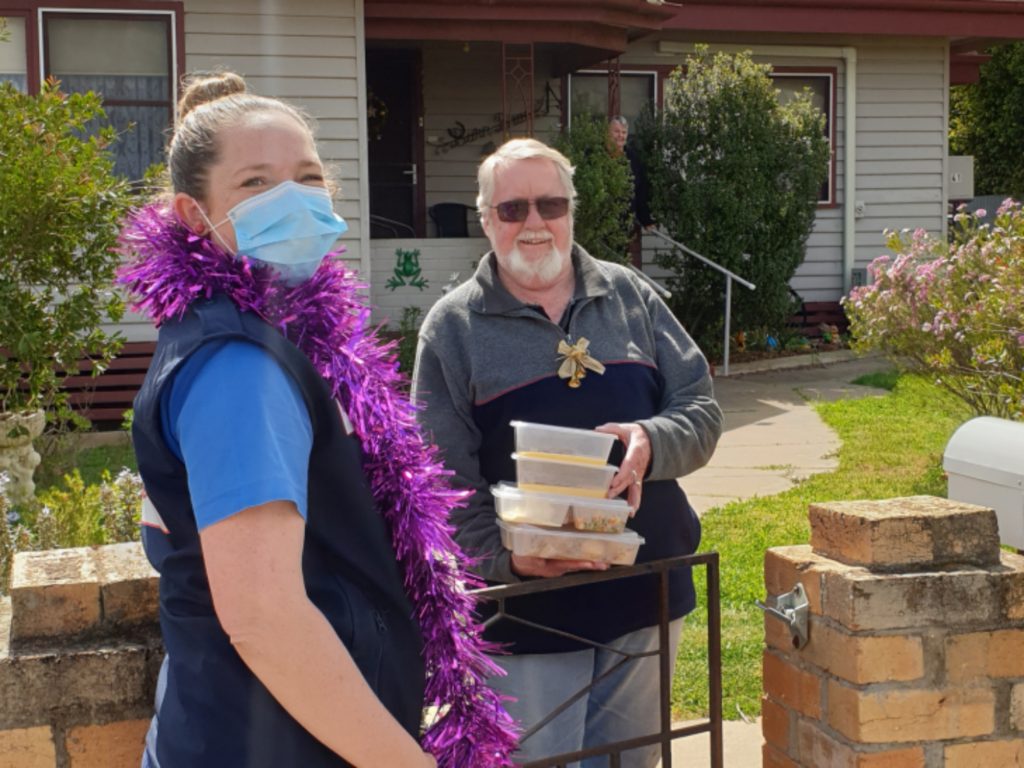
Deep in country Victoria, a definitive before and after makeover is apparent. For years the Golf Club of Warracknabeal, about 340 km north west of Melbourne, made do with a rusty and weathered roof sitting atop a building nearly 100 years old.
While the region is known for its grain, the town has been hit hard by the ravages of drought and subsequently COVID-19. Since the mid 1900s, the Warracknabeal Golf Club has held birthday parties, weddings, wakes, meetings and everything in between. A warm welcoming atmosphere has always been their intention, although this has become increasingly difficult to offer with the decline of the building, most notably its roof.
But with the support of a grant through FRRR’s Tackling Tough Times Together program, funded by the Australian Government, the Warracknabeal Golf Club launched their Green Roof Project.
With the $46,125 grant, and with the help of professionals and a swathe of willing and hardworking volunteers, they replaced the old leaking roof with a green’ roof. In addition to the new roof, the old and worn guttering was replaced and insulation and sisalation installed to facilitate far greater energy efficiency.
David Baxter from the golf club commented that modernising the building has reignited interest in the Golf Club as somewhere for people to gather and come together as a community in a now very comfortable environment.
“In recent years, we had seen very few functions but this year the increase in its use has been great. Organisations such as VFF, Lions Club, local schools, Grain Corp, the Arts Council and Lutheran Ladies have since used the facility and commented on the improvements particularly on the heating/cooling aspect.”
Mr Baxter noted his resounding gratitude for the project being able to go ahead.
“So much has been achieved thanks to the grant from FRRR, which made it possible earlier than we anticipated, as major fundraising over a number of years would have been required.
“More than ever, we are looking forward to becoming an important cog in our community in providing a place to meet, socialise and celebrate”.
